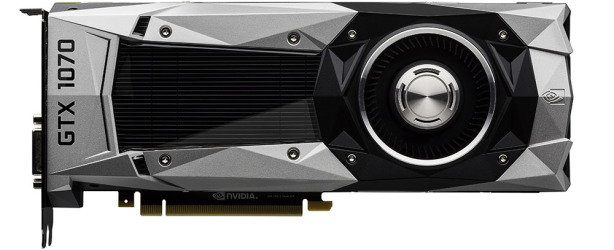Asus GeForce GTX 1070 Strix Review
Asus GeForce GTX 1070 Strix Review
Manufacturer: Asus
UK price (as reviewed):£469.99 (inc VAT)
US price (as reviewed): MSRP TBC
GTX 1070 Overview
The GTX 970 was a game changer in the GPU market and undoubtedly the best card of the previous generation. It balanced performance, efficiency and price extremely well and was hugely successful for Nvidia as a result – in the GTX 900 series, Nvidia left the hitherto extremely important sub-£200 price point completely unfilled (there was never a GTX 960 Ti), and the strength of the GTX 970 persuaded many people to step up a pricing tier or two for their upgrades.
Last month, Nvidia launched Pascal, which also looks set to be a strong architecture, particularly in the world of VR. However, both the GTX 1080 and GTX 1070 have launched at considerably higher price points than their Maxwell counterparts (going by name). The former can be had for £525 in its most basic form, while the latter has a £365 starting price. Of course, the GTX 1070’s price is definitely more palatable, and it should offer better bang for your buck as well, but that doesn’t change the fact that this is still a hefty chunk of cash to drop on a graphics card.
We’ve already been through the architectural changes and feature upgrades that Pascal brings to the table in our first GTX 1080 review, so if you’re not caught up you’ll find all the details there. The GTX 1070 uses the same GP104 GPU, just with a few bits culled. Specifically, Nvidia has disabled five SMs, or put another way one of the four GPCs is no longer in play. This reduces the stream processor and texture unit count both by 25 percent, to 1,920 and 120 respectively.
The back-end of the GTX 1070 is left totally in tact, meaning you get the full complement of 64 ROPS and 2MB L2 – Nvidia isn’t playing any funny games with partitioned memory this time around.
| Nvidia GeForce GTX 1080 8GB | Nvidia GeForce GTX 1070 8GB | Nvidia GeForce GTX Titan X 12GB | Nvidia GeForce GTX 980 Ti 6GB | Nvidia GeForce GTX 980 4GB | |
| GPU | |||||
| Architecture | Pascal | Pascal | Maxwell | Maxwell | Maxwell |
| Codename | GP104 | GP104 | GM200 | GM200 | GM204 |
| Base Clock | 1,607MHz | 1,506MHz | 1,000MHz | 1,000MHz | 1,126MHz |
| Boost Clock | 1,733MHz | 1,683MHz | 1,075MHz | 1,075MHz | 1,216MHz |
| Stream Processors | 2,560 | 1,920 | 3,072 | 2,816 | 2,048 |
| Layout | 4 GPCs, 20 SMs | 3 GPCs, 15 SMs | 6 GPCs, 24 SMMs | 6 GPCs, 22 SMMs | 4 GPCs, 16 SMMs |
| Rasterisers | 4 | 3 | 6 | 6 | 4 |
| Tesselation Units | 20 | 15 | 24 | 22 | 16 |
| Texture Units | 160 | 120 | 192 | 176 | 128 |
| ROPs | 64 | 64 | 96 | 96 | 64 |
| FP64 Performance | 1/32 FP32 | 1/32 FP32 | 1/32 FP32 | 1/32 FP32 | 1/32 FP32 |
| Transistors | 7.2 billion | 7.2 billion | 8 billion | 8 billion | 5.2 billion |
| Die Size | 314mm2 | 314mm2 | 601mm2 | 601mm2 | 398mm2 |
| Process | 16nm | 16nm | 28nm | 28nm | 28nm |
| Memory | |||||
| Amount | 8GB GDDR5X | 8GB GDDR5 | 12GB GDDR5 | 6GB GDDR5 | 4GB GDDR5 |
| Frequency | 1.25GHz (10GHz effective) | 2GHz (8GHz effective) | 1.75GHz (7GHz effective) | 1.75GHz (7GHz effective) | 1.75GHz (7GHz effective) |
| Interface | 256-bit | 256-bit | 384-bit | 384-bit | 256-bit |
| Bandwidth | 320GB/sec | 256GB/sec | 336GB/sec | 336GB/sec | 224GB/sec |
| Card Specifications | |||||
| Power Connectors | 1 x 8-pin | 1 x 8-pin | 1 x 6-pin, 1 x 8-pin PCI-E | 1 x 6-pin, 1 x 8-pin PCI-E | 2 x 6-pin PCI-E |
| Stock Card Length | 267mm | 267mm | 267mm | 267mm | 267mm |
| TDP | 180W | 150W | 250W | 250W | 165W |
Instead of the new GDDR5X that the GTX 1080 uses, the GTX 1070 sports standard GDDR5, although at a higher speed than in previous cards: 2GHz, for an effective speed of 8Gbps. Coupled with the 256-bit memory interface, this nets us a maximum bandwidth of 256GB/sec. Now, Nvidia does use its fourth generation delta colour compression technology with Pascal, which helps to make more use of the available memory bandwidth than previous architectures allowed, but even so this reduction in bandwidth will likely see performance hampered more as you increase the resolution, although the degree to which it is affected, if at all, will of course be game-specific.
The final difference is the clock speed, which has been lowered too, likely so that Nvidia can get a bit more yield from the GP104 GPUs. Compared to the GTX 1080, the base clock drops by 101MHz to 1,506MHz (still much higher than any Maxwell part) and the boost speed is 50MHz lower at 1,683MHz. Of course, Nvidia’s many board partners are offering SKUs with a variety of clock speeds. One such partner is Asus, which has supplied us with our first GTX 1070 for review. Head on over the page to find out all about the GTX 1070 Strix and see how it performs.

